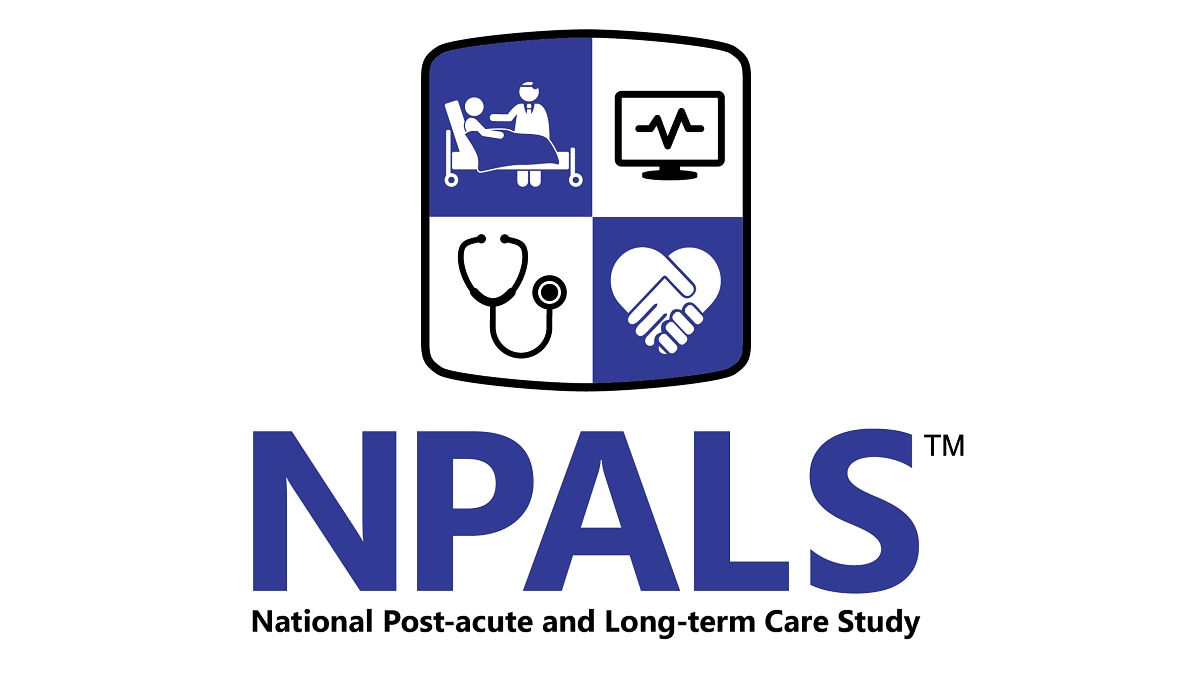Key points
- NPALS is the National Post-acute and Long-term Care Study.
- NPALS estimates the supply and use of post-acute and long-term care services.
- NPALS uses both surveys and existing data from post-acute and long-term care services providers.

Overview
NPALS collects and analyzes data from U.S. providers serving people who need continuing care after urgent medical treatment (post-acute care) or who cannot care for themselves for a long period (long-term care). The National Center for Health Statistics (NCHS) has conducted NPALS every two years since 2012.
The main goals of NPALS are to:
- Estimate the supply and use of paid, regulated, post-acute and long-term care services providers
- Estimate key policy-relevant characteristics and practices
- Produce national and state-level estimates, where feasible
- Compare estimates among sectors
- Monitor trends over time
NCHS works with RTI International, a non-profit research organization, to conduct NPALS.
What's collected
NPALS
- Provides information on seven major sectors of paid, regulated, post-acute and long-term care services, providers, and services users
- Uses existing Centers for Medicare and Medicaid Services (CMS) data for five sectors:
- Nursing homes
- Home health agencies
- Hospices
- Inpatient rehabilitation facilities
- Long-term care hospitals
- Collects data directly from two other sectors—adult day services centers and residential care communities—through provider surveys, when CMS data are not available
- Allows comparisons among sectors at a similar point in time and over time
Adult Day Services Center Survey
Residential Care Communities Survey
Survey status
Fielding of the 2022 Adult Day Services Center and Resident Care Community survey ended in March 2023. Samples of adult day services centers and residential care communities that received a survey were eligible to participate.
Data and documentation
NPALS provides detailed reports and documentation to support analysis and use of NPALS data. In producing these resources, NPALS staff prioritizes protecting the privacy of patients and clients, centers, communities, and their administrative and medical staff.
Reports and survey documentation
Findings from the 2012, 2014, 2016, 2018, 2020, and 2022 survey waves are available from the Study Results and Publications pages. Questionnaires from the 2012, 2014, 2016, 2018, 2020, and 2022 survey waves can be found on the Questionnaires, Data Sets, and Related Documentation page.
Public use and restricted data files
Public use files (PUFs) from the 2018 adult day and residential care surveys are available to download from the NPALS website. All potentially identifiable information about providers and users were removed from PUFs to ensure the confidentiality of respondents.
Restricted data files for the 2012, 2014, 2016, 2018, 2020, and 2022 adult day services center and residential care community surveys are available through NCHS's Research Data Center (RDC) for a fee.
What's new from NPALS
- Personal Care Aides in Adult Day Services Centers and Residential Care Communities: United States, 2022 (7/29/2025)
- Overview of Post-acute and Long-term Care Providers and Services Users in the United States, 2020
- State estimate update: Biennial Overview of Post-acute and Long-term Care in the United States: Data from the 2020 National Post-acute and Long-term Care Study (8/2024)
- Residential Care Community Resident Characteristics: United States, 2022
- QuickStats: Percentage of Adult Day Services Centers That Use Any Telehealth, by U.S. Census Bureau Region — United States, 2022
- Adult Day Services Center Participant Characteristics: United States, 2022
- QuickStats: Percentage of Residential Care Communities That Use Electronic Health Records, by Community Bed Size — United States, 2018, 2020, and 2022 (5/2/2024)
- Infection Control Policies and Practices in Residential Care Communities by Selected Organizational and Geographic Characteristics: United States, 2020 [PDF – 354 KB] (2/22/2024)
- Alzheimer Disease or Other Dementias in Adult Day Services Centers, 2020 [PDF 356 KB] (1/25/2024)
- 2022 Survey Methodology for the Adult Day Services Center and Residential Care Community Components [PDF – 275 KB] (1/2024)
- UPDATED: Biennial Overview of Post-acute and Long-term Care in the United States: Data from the 2020 National Post-acute and Long-term Care Study (10/2023)
Data tell stories. Tell us yours!
Has information from NPALS helped you? Your stories help us showcase the value of NPALS. Email a brief description of how you've used NPALS data to LTCSBFeedback@cdc.gov. Use "My NPALS data use example" as the subject of your message.
Resources
Visit these websites to learn more about current healthcare provider surveys, and retired surveys that looked at long-term care sectors.
National Health Care Surveys Program
